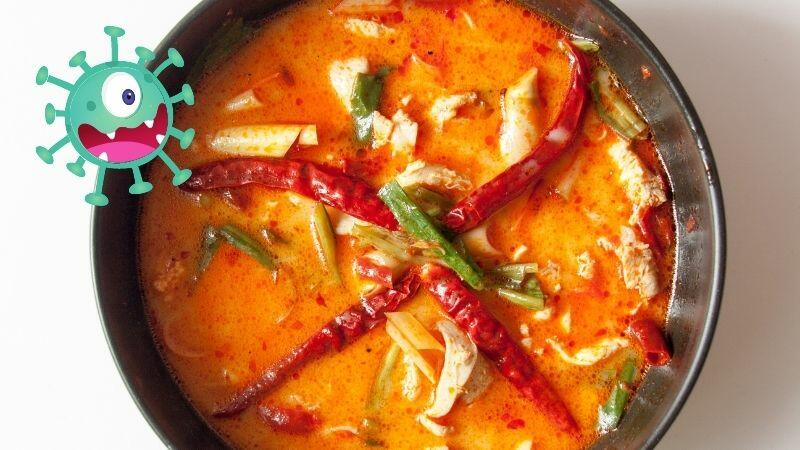Spicy food fanatics rejoice – your favorite fiery dishes offer some antibacterial benefits. But before you dump extra hot sauce on everything, know that the heat can also destroy good bacteria. So does spicy food kill bad and good bacteria?
The short answer is yes, spicy foods contain compounds that can indiscriminately kill both helpful and harmful bacteria in your body. While this antimicrobial effect has pros and cons, science shows that spicy eaters need not extinguish their heat.
The key is moderation. Harnessing
The antimicrobial compounds in spices responsible for their trademark spicy zing – capsaicin, piperine, allicin, and gingerol – each combat bacteria through different mechanisms. Capsaicin from peppers, piperine from black peppercorns, allicin from garlic, and gingerol from fresh ginger all weaken bacterial cell walls and disrupt enzymatic processes needed for survival. So a little
How Do Spices Kill Bacteria?
Experts suggest the antibacterial properties of spices come from protective phytochemicals – compounds that can slow or halt the growth of microorganisms before they produce toxins.
The chemicals responsible for the spicy heat in spices like capsaicin, piperine, allicin, and gingerol damage bacterial cells in different ways:
Capsaicin
- Found in chili peppers and plants like oregano, cilantro, cinnamon
- Inhibits intracellular invasion and hemolytic activity in bacteria like streptococci
- Slows the growth of Escherichia coli, a beneficial bacterium
- Has high vitamin C content to boost immunity and circulation
Piperine
- Main alkaloid in black pepper giving its spicy flavor
- Alters permeability of bacterial cell membranes, leading to electrolyte loss and cell death
- Shows bactericidal activity against Escherichia coli, Staphylococcus aureus, Bacillus subtilis, and Salmonella species
Allicin
- Main antimicrobial compound in fresh garlic and onions
- Has antibacterial and antifungal effects against gram-positive and gram-negative bacteria
- Disrupts bacterial enzymes and DNA gyrase to halt growth
Gingerol
- Found in fresh ginger, causes spicy heat sensation on the tongue
- Has antioxidant, anti-inflammatory, and antimicrobial effects
- Inhibits growth of bacteria involved in periodontitis and other oral infections
What Are Good Bacteria and Why Are They Important?
Good bacteria, also called commensal bacteria, are beneficial microorganisms that support proper body function. They outnumber human cells in the body. Some examples of good bacteria strains:
Lactobacillus
- Found in the gut and urinary tract
- Aids digestion by producing lactic acid and lactase enzymes
- Prevents lactose intolerance symptoms like diarrhea
Bifidobacteria
- Naturally present in the intestines
- Used to treat diarrhea, constipation, irritable bowel diseases (IBDs)
- Helps digestion and nutrient absorption
- Fights against harmful bacteria
These and other commensal bacteria mostly reside in the digestive system and are collectively called gut microbes. The gut houses 70% of the immune system and is considered key for overall health.
Top Antibacterial Spices
Studies show certain spices have exceptional bacteria-inhibiting abilities. The top antibacterial spices include:
- Garlic, onion, oregano – kill up to 100% of bacteria
- Thyme, cinnamon, tarragon, cumin – kill up to 80% of bacteria
- Chili peppers, cayenne, peppers – kill up to 75% of bacteria
- Ginger, anise, celery seed – kill up to 25% of bacteria
Researchers found garlic, onion, and oregano to be broadly effective bacteria killers. Thyme, cinnamon, tarragon, and cumin ranked second, eliminating around 80% of bacteria. Chili peppers, cayenne, and other spicy peppers showed about 75% bacteria-killing action. White/black peppers, ginger, anise seed, and celery seed were the least potent, inhibiting 25% of bacteria.
The Antibacterial Effects of Chili Peppers
Chili peppers contain a powerful compound called capsaicin that gives them their trademark heat. Studies show capsaicin has potent antibacterial properties against Salmonella and Helicobacter pylori, bacteria that cause food poisoning and stomach ulcers respectively. So spicing up your meals with chili peppers can impart more than just flavor!
How Black Pepper Fights Oral Bacteria
The piperine in black pepper lends its pungent taste and aroma, but also antibacterial benefits. Black pepper extracts strongly inhibit two types of bacteria that cause cavities and gum disease – Streptococcus mutans and Porphyromonas gingivalis. Sprinkling black pepper on meals or chewing whole peppercorns may be a smart
The Antifungal Effects of Garlic
Allicin, the main bioactive compound in garlic, gives it the ability to kill certain disease-causing fungi. Studies demonstrate garlic’s antifungal activity against major offenders like Candida albicans, Cryptococcus neoformans, and Aspergillus. Regularly cooking with garlic offers a tasty way to combat fungal overgrowth.
Probiotics for Gut Health
Since antibacterial spices kill good bacteria too, taking daily probiotic supplements can help counterbalance the effects. Probiotics contain live cultures of strains like Lactobacillus and Bifidobacterium that replenish healthy gut flora. Pairing probiotics with spicy meals may allow you to enjoy bacterial benefits without sacrificing your microbiome.
Frequently Asked Questions
Do spices cause stomach problems?
No, spices do not directly cause ulcers or bowel diseases, but they can aggravate existing conditions in susceptible people.
Is spicy food bad for your immune system?
No. Spicy foods are rich in antioxidants like vitamins A and C that reduce inflammation and support immune function.
Can spicy food replace antibiotics?
While spices have antibacterial properties, they are not as potent as antibiotics that can wipe out bacteria on a microgram level. Spices work in milligrams and cannot replace prescription antibiotics.
The Takeaway
There is now convincing evidence that spicy foods can indeed kill good bacteria, debunking the myth that only antibiotics impact gut flora. Research substantiates the antimicrobial effects of spices, though the theory needs more acceptance. Specific phytochemicals in spices damage bacterial cells in different ways to inhibit their growth and activity.
However, spices do not discriminate between helpful and harmful bacteria. Using antibacterial spices regularly could potentially disrupt the delicate balance of gut microbiota. Nevertheless, spicy food lovers need not reduce their heat – just be aware of the bacterial implications.
Moderation may be key to harnessing the benefits of spices without sacrificing the good bacteria.





